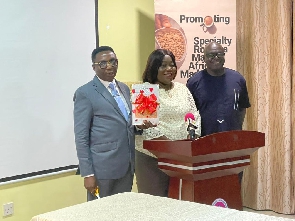A handbook that is billed to serve as the working manual for the effective cultivation, production and processing of coffee in Ghana and by extension, Africa has been launched in Accra.
At a brief ceremony held at the premises of the Council for Scientific and Industrial Research (CSIR) on Thursday, July 13, 2023, the handbook was outdoored with industry players and stakeholders expressing confidence that the manual will serve as the cure for the challenges in the coffee production sector and transform the industry wholistically.
Delivering a welcome address, the Director of the CSIR-FRI, Professor Charles Totoe commended the various persons and organizations who were instrumental in the production of the book.
Professor Totoe disclosed that the book is tailored for the Ghanaian and African coffee production industry as it provides solutions to every challenge in the production chain.
He appealed to industry players to embrace and adopt the quintessential coffee production measures in the book, boasting that it will lead to enormous gains and improve the livelihoods of farmers and all those in the value chain.
Outlining some features of the book, Professor Totoe mentioned the user-friendliness and the practicality of the recommendations as some of the reasons he is excited about it and wants farmers and stakeholders to adopt it.
He noted that the time has arrived for Ghana to intensify its production of Robusta coffee, expand the market, and position itself as one of the leading countries for the production of Robusta coffee.
“Robusta coffee is popular in Ghana. We grow it in the Western, Oti, Bono, Volta, Ashanti, Central, Ahafo, and Eastern Regions. This tells you that we have the potential of expanding it in our country. We should also diversify coffee for its value-added products.
“This handbook is for us to address the challenges, gain from the potential of coffee and improve the livelihood of small-holder farmers of coffee in our country. We have challenges such as poor harvesting, technology, use of inappropriate equipment in coffee value addition and poor manufacturing practices and lack of innovation, and we believe this handbook will address those challenges,” he said.
Larry Attipoe, an official of the International Trade Centre observed that there is high demand for Robusta coffee in Ghana and Africa and that farmers and processors must leverage on the demand to improve their gains.
He challenged the farmers to not only increase production but also ensure that the quality of the coffee meets international standards.
Larry Attipoe cautioned the Ghanaian producers to be wary of their Eastern African counterparts who are looking to leverage the AFCTA to export their products to the West African market.
On her part, Madam Ivy Cynthia Osei Sampah of ACRAM which is an international non-profit association bringing together private and public operators interested in Robusta coffee, noted that the prices of Robusta coffee have been on an upward trajectory for some time now and that huge opportunity exists for farmers and players to make some good income.
She urged them to make the market more competitive by producing coffee that meets the quality of the international markets.
There were also messages from the stakeholders such as COCOBOD, the Ministry of Food and Agriculture, and GEPA, among others.
The handbook which is dubbed ‘Harvesting, Post-Harvest Management and Processing of Coffee’ was funded by the European Union, ITC, ACRAM and others.
General News of Friday, 14 July 2023
Source: www.ghanaweb.com

















